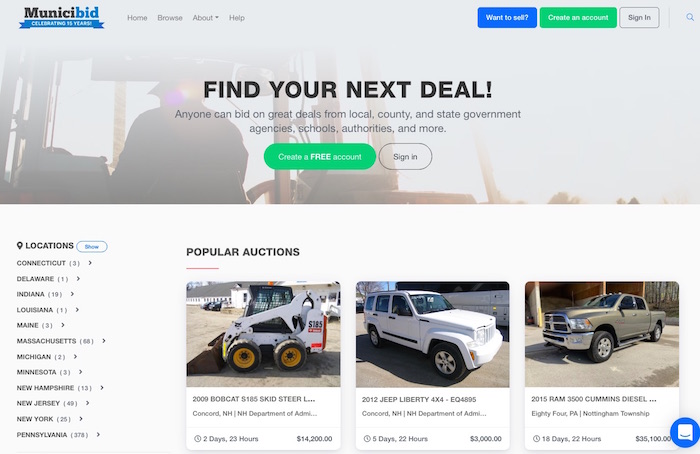When entrepreneurs need to buy used vehicles or equipment for their businesses, they typically turn to seller apps and online marketplaces like Craigslist to see if they can save a buck. However, these platforms are filled with scammers, false descriptions of items, and other issues. Thankfully, there is an even better way for business owners to buy quality pre-owned vehicles and more for their enterprises: with the Municibid online government auction marketplace. This website is a god-send for budget-minded entrepreneurs!
Municipalities, public schools, fire departments, agricultural departments, and other government agencies turn to Municibid to sell their surplus vehicles and more directly to the public, 24 hours a day. Police departments even use Municibid to auction off their forfeitures! Home Business Magazine had the opportunity to chat with Municibid CEO & founder Greg Berry, who was happy to share the inspiration for his company and how business owners can benefit from using government auctions.
HBM: You are the founder of Municibid. Can you tell us about your company?
GB: “Municibid is an online auction marketplace where over 4,000 state and local governments and schools auction items that are no longer needed, forfeitures (seized items), and lost-and-found items to the public.
Founded in 2006, we’ve helped municipalities take advantage of the online marketplace to get 50-200% more for their items than they would with traditional sealed bids or newspaper ads. We don’t charge a penny for municipalities to use Municibid, so 100% of the proceeds they receive go back into the community.
Municibid is the easiest way for municipalities to sell their surplus. They pick the items they want to sell, take a few photos, fill in an item description, and that’s it. We do all of the heavy lifting with marketing their items, running the bidding system, and providing sales reports. Likewise, it’s a streamlined process for buyers to place bids and pick up items they win.”

HBM: What inspired you to found Municibid?
GB: “I was in a council meeting and we sold a Chevy truck for $500. It was easily worth at least $5,000. Then, about 30 minutes later, we bickered about spending $1,000 on a community project. It was 2005 and I was 25 years old. There was an open town council seat in the Borough of Pottstown, Pennsylvania. I was born and raised in Pottstown, an industrial town in the ’70s and ’80s that went stagnant. I wanted to help revitalize the town that had shaped who I was, starting with building a new annex at the community college and economic development. I ran and won the seat.
I sat in hundreds of town council meetings and it happened again and again. We sold vehicles, equipment, and other items for pennies on the dollar through a sealed bid process. A sealed bid is when people put their bid in an envelope and drop it off or mail it in. Then on a specific date, the government opens all the bids and awards the item to the highest bid.
Oftentimes, a Ford Crown Victoria worth $3,000 would be sold in a sealed bid for $300. There was no competition, as no one saw what anyone else was bidding. Plus, there was very little advertising for these items so hardly anyone knew these items were for sale. The Borough of Pottstown was losing tens of thousands of dollars with this archaic process that they could have been reinvesting back into the community.
How many other townships across the state — across the country — were doing the same? Why weren’t we selling our items online? Why weren’t we using eBay? In 2006, Pennsylvania local governments were just then legally allowed to sell online, but very few were. A few municipalities were using Craigslist and others were trying out eBay. Neither Craigslist nor eBay were set up to meet the requirements governments have for selling their surplus. Plus, neither had any customer service or guidance for this uncharted territory for governments.
The day after graduating high school, I founded an IT company that I grew for 12 years and eventually sold in 2010. With my background in technology, I built the first version of Municibid for about $2,000. It was nothing fancy, but it was good enough to run a basic online auction. I convinced a few local municipalities to give Municibid a try. The first item listed on Municibid was a riding mower by the Borough of Pennsburg, Pennsylvania. They were hoping to sell it for $100. It sold for $500.
Then another township listed a Ford Crown Victoria with a blown engine. They just wanted to get rid of it and maybe get a few hundred dollars for it. It sold for $2,800. They truly didn’t believe it. They thought something was wrong — and to be honest, so did I — until the guy showed up with a $2,800 check and a flatbed. Needless to say, they were ecstatic.
Meanwhile, I spent every hour I could getting the word out about Municibid and the items that were up for auction. I made those flyers with tear-off tabs you see hanging on community bulletin boards and posted them at The Home Depot, Lowes, grocery stores, anywhere. I ran small ads in the classified section of the newspaper and in those penny pincher magazines at convenience stores.
I took these results and the testimonials from the governments on the road and, as they say, the rest is history.”
HBM: How can startups benefit from government auctions? What kinds of items can businesses purchase?
GB: “When you’re first building a company, you have a limited budget to get your minimum viable product running. Government auctions provide you with the items you need at a great value to get you going. Oftentimes, governments have regularly scheduled maintenance for their items or rotate items out of service at regular intervals. You’ll find great deals on items that would be marked up at least 50-100% from used dealerships and stores. It’s also an easy process from placing a bid, winning, to picking up the item. There’s also no salesman trying to upsell you on other services or items you don’t need.
Startups today often put a high focus on their social and environmental mission. When you win a government auction, you’re reusing items that often still have a lot of good life in them. And you’re keeping them out of landfills! Plus, you’re helping local communities build a new park or buy a new truck to maintain their roads and community centers.
Government auctions are an excellent source for startups and entrepreneurs to find great deals on a wide variety of items. I’ve seen everything from diamond rings to arcade games, from pallets of computers to boats, sell on Municibid. For example, if you have a side hustle where you buy and flip items, you can find items to buy, fix up, and flip, as well as buy a pickup truck and a trailer to haul your finds and deliver the flipped items to buyers.
Tech startups can find used computers and electronics available in bulk, as well as furniture to outfit their offices. For contractors or landscapers, you can find awesome deals on used mowers, tractors, tools, and heavy equipment. Whatever your industry, you can find something you can use at a government auction.”
HBM: Why are government auctions better than other auctions for making these big purchases?
GB: “Governments tend to take very good care of their equipment and vehicles and some have regular replacement schedules, so the equipment has useful life remaining. In other situations, governments might buy an excess of equipment they end up not needing, or projects change and the equipment to do the job is no longer needed.
For example, a town bought a new food truck to use as a temporary concession stand at the community park while the new, permanent stand was being built. Then COVID-19 hit, and they ended up never using the food truck.
With government auctions, you’re purchasing from public municipalities with credibility, not an unknown individual with no accountability. As with any purchase, it’s important for you to do your due diligence and make sure the item is the one for you. With government auctions, item descriptions are accurate and you’ll be getting the item as described.”
HBM: Anything else that our readers would find interesting about the world of government auctions?
GB: “There are some interesting stories behind the items. We had an airplane that was used to fly drugs from Las Vegas to Philadelphia. A lot of classic police cars and fire trucks that were used in the force and parades. There were also some neat military vehicles like Humvees, Unimogs, and Peacekeepers. Then there are items that you can’t buy from a store anymore, like Polaroid cameras and antique arcade games.
You can even buy real estate at a government auction — oftentimes it’s parcels of land, and sometimes there are buildings too. For instance, we’ve had an armory and swimming pool building. For those new to government auctions, it’s easier and more pleasant to work with governments than you might expect. While some governments have specific terms for how and when items need to be paid for and picked up, overall, they’re happy you’re picking up items they don’t need anymore.
It’s a win-win for everyone. You get a great deal and governments have more funds for enriching communities.”
Find a Home-Based Business to Start-Up >>> Hundreds of Business Listings.


















































